About Willys Vehicles - CJ-5, 6
About Willys Jeep CJ-5, 6
History and Technical Specs
(1955-1983) Willys CJ-5 "Universal"
Production Total: 603,303
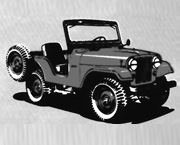
CJ-5 Illustration
In 1955, under new leadership by Kaiser Industries, Willys Motors began to promote their newest member of the CJ series, the CJ-5, a model that marked a significant departure from the "flat-fender" CJs, with its rounded front fender design and squeezed grille (to accommodate larger headlights). Influenced by the Korean War M38A1 Jeep, the CJ-5 included updates such as rounded fenders, a hood and body made of heavy gauge sheet metal, a larger windshield frame, increased length on the riding springs, form fitting front adjustable bucket seats, a deeper, back-lit instrument panel, rear seating options for 4 passengers, and a new passenger car type handbrake located to the left of the driver underneath the instrument panel.
In 1965, the CJ-5 and CJ-6 four-cylinder Willys Hurricane Engine was supplemented with 155 hp (116kW), as a result of Kaiser having purchased the casting rights to the Buick 225 cu in (3.7 L) V6 Dauntless.
While the CJ-5 remained fairly consistent throughout many years of production, 1972 brought with it several changes worth mentioning. In 1970, Kaiser ownership was replaced by a new company, American Motors (AMC). It was decided in 1971, that the GM engine would be retired, replaced in the following year (1972) with engines made by American Motors, the one-barrel 248 ci in (4.2L) and the AMC 304 cj in (5L) V8 engine. In order to make room for the new engines, the fenders and hood were stretched 5 inches (127 mm) and the wheelbase was stretched 3 inches (75 mm). Updates to the drive train at that time included the front axle becoming a full-floating Dana 30.
1976 brought several new changes - the tub, frame and windshield frame were modified. As a result, tops from years 1955-75 will not fit a 1976-83 CJ-5 and vice-versa.
In 1979, the standard engine became the 258 cu in (4.2 L) which now featured a two-barrel carburetor.
Starting in 1980 and on through the close of production in 1983, the CJ-5 came factory with a "Hurricane"-branded version of the GM Iron Duke I4.
The Tuxedo Park: Trim package, CJ-5, or CJ-6?
In 1961, Kaiser was coming to the realization that it had an image problem. The broader masses believed the Jeep to be a great…vehicle — that is, if you needed to work on the farm, go hunting, or partake in some other industrious activity. To fix this “problem” they decided to introduce a new, more “upscale” version of the CJ-5. Accordingly, in 1961, the Tuxedo Park was introduced as a trim package. It is widely believed that these trim packages (Tuxedo Park I, II and III) were offered between 1961-1963, and included chrome add-ons, along with an “Indian Ceramic” steering wheel (in place of the standard black). The seats also received an upgrade to “Black British Calf Grain Vinyl with Indian Ceramic Facings” (Trim Code L-29).
In 1964, Kaiser promoted the Tuxedo Park as it’s own separate model (Tuxedo Park Mark IV) for the CJ-5A and CJ-6A. The Tuxedo Park Mark IV included several options that set it apart from the standard Jeep®. These options included:
- Chrome front bumper
- Chrome hood badges
- Windshield clamp catch
- Chrome drop down license plate holder
- Chrome tail lamps
- Hubcap displaying the “Jeep” emblem
- Column shift
**If you suspect you may have one of these models, check the prefix of your vehicle’s VIN tag. The CJ-5A Tuxedo Park Mark IV has a prefix of “8322?, while the CJ-6A Tuxedo Park Mark IV has a prefix of “8422?.
Unfortunately, this model never gained the popularity that was hoped for, and only approximately 460 of the CJ-6A models were ever produced, making them a rare find for those in the market. If you have a Tuxedo Park Mark IV, it is much more likely that yours is one of the CJ-5A models. While these vehicles did not capture the undivided attention of the masses, they were a valid attempt at becoming something “more” than what Jeep® appeared to be in 1960, and opened the door for other models that were to come…
Special CJ-5 Models:
1961-1963 Tuxedo Park Mark III
1965 "Tuxedo Park Mark IV"
1969 Camper
1969 462
1970 Renegade I
1971 Renegade II
1972-1983 Renegade Models
1973 Super Jeep
1977-1983 Golden Eagle
1979 Silver Anniversary
Service Guides and Documents:
Jeep Dipstick Guide- Document provided courtesy of Michael Scoggins
For more information on the Universal CJ Series models, visit our CJ-2A, CJ-3A and CJ-3B history pages.
CJ-5 Photos
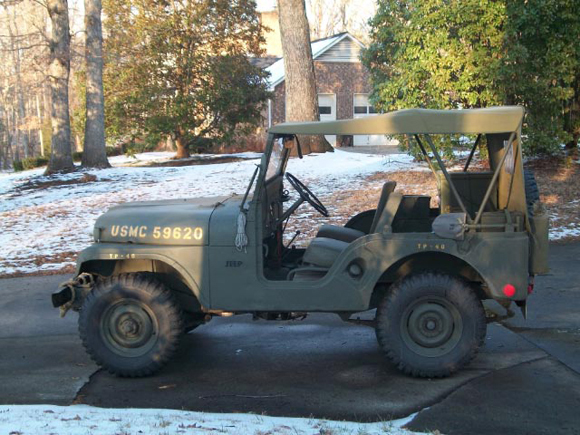
Rick Conner - 1955 CJ-5
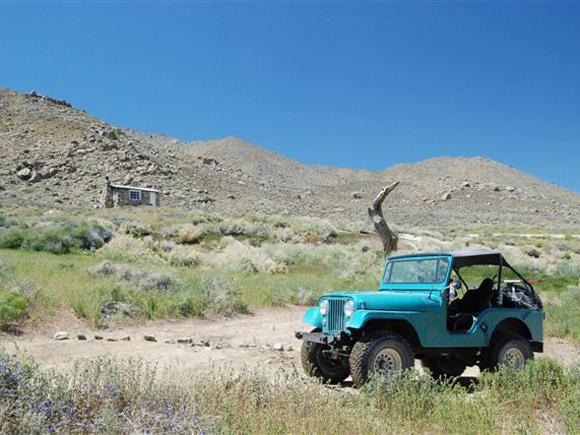
Chuck Mitchell - 1957 CJ-5
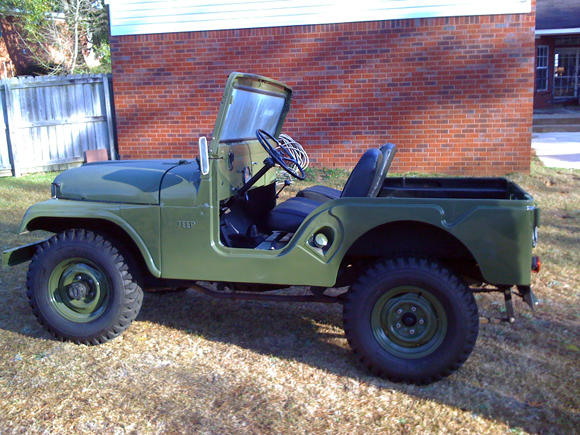
Clint Pressley - 1960 CJ-5
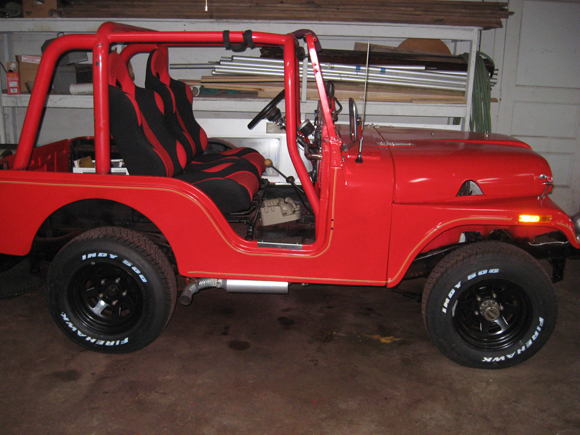
Joe Theis - 1961 CJ-5
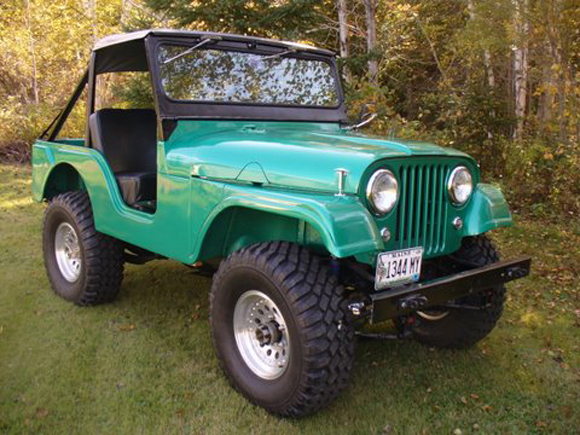
Duke - 1962 CJ-5
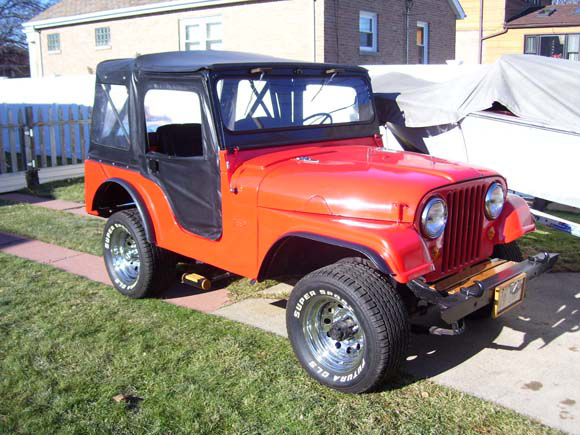
Bill Wagner - 1963 CJ-5
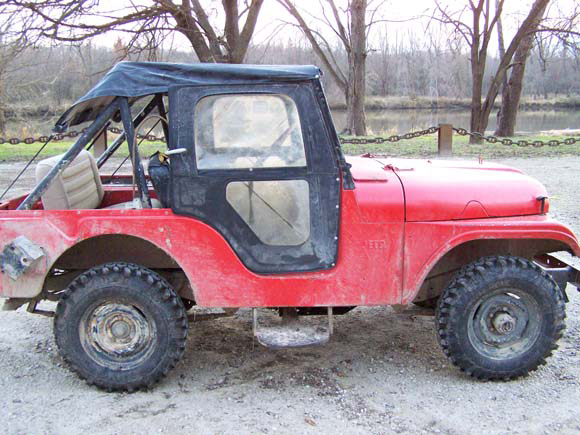
Jessetonda Smith - 1964 CJ-5
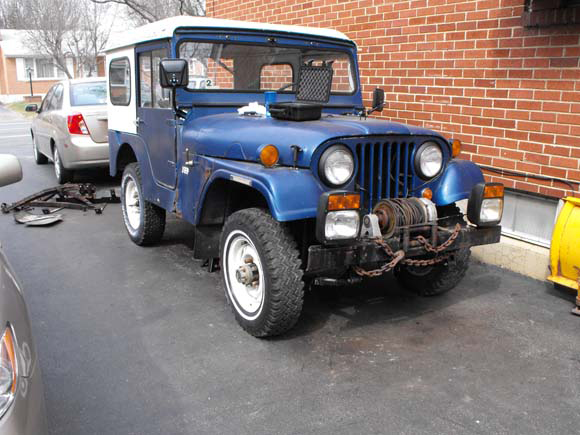
Mike Otte - 1965 CJ-5
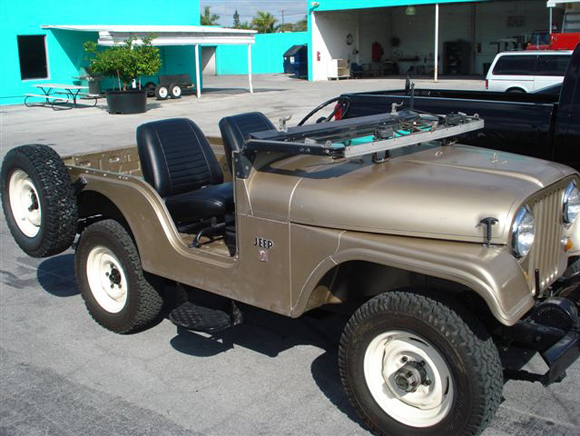
Bryan Pyke - 1966 CJ-5
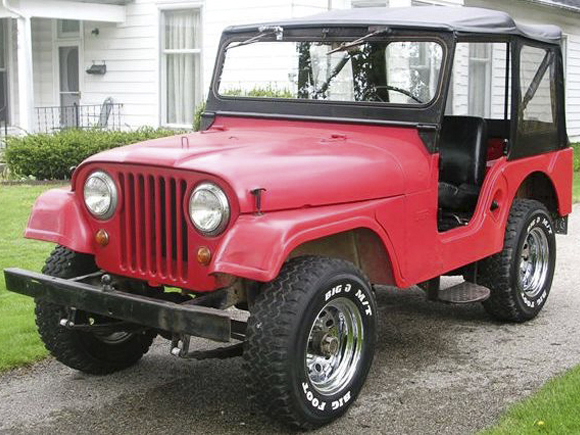
Jason King - 1967 CJ-5
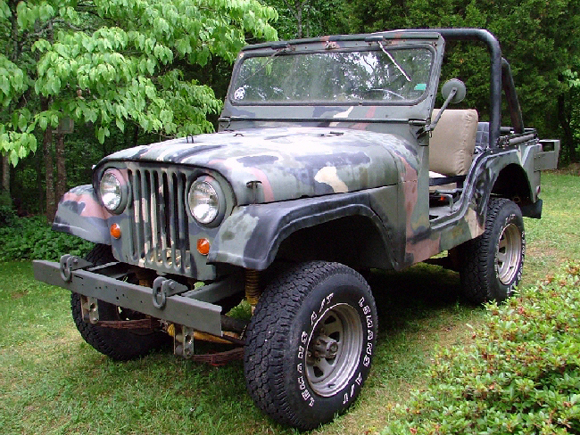
Charles Kent - 1968 CJ-5
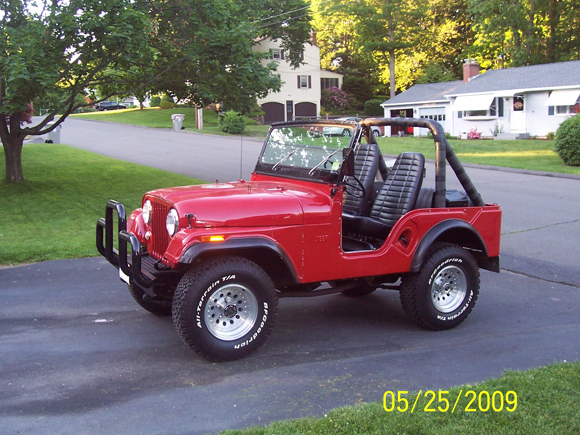
Tim Tighe - 1969 CJ-5
For more photos of these and other Willys Jeep Models, visit our Willys Jeep Blog Customer Photo Album!
CJ-5 Specs
| Weight: (Gross): 3750 lb. (1701,0 kg.) (Shipping): 2163 lb. (981,1 kg.) (Curb): 2274 lb. (1031,5 kg.) Length (overall): 135 9/16” (3,44 m.) Width (overall): 71 3/4” (128 cm.) Height (overall): 67” (170 cm.) Ground Clearance: 8” (20,3 cm.) Tread (front and rear): 48 7/16” (123 cm.) Fuel Capacity: 10 1/2 Gal. Transmission: T-90 Transfer Case: Dana 18 Front Axle: Dana 25 (1952-60) or Dana 27 (1961-1971) Rear Axle: Dana 44 Wheelbase: 81” (206 cm.) Other: 1 Piece Windshield, Fenders curve down |
CJ-5 Engines:
| 4-134 F Head Motor (473 or 475) Years Offered: 1955-1971 CJ-5 Engine Type: F4-134 Hurricane 14 Number of Cylinders: 4 Cubic-In. Displacement: 134.2 cu. in. (2199,53 cm 3) Horsepower: 60 hp (45 kW) @ 4000 rpm Torque: 114 ft-lb. (15,7 Kg-m.) @2000 rpm Compression Ratio: 6:48:1 Valvetrain: F-head |
V6-225 Dauntless Motor (473) Years Offered: 1966-1971 CJ-5 Engine Type: Buick 225 V6 Engine Number of Cylinders: 6 Bore x Stroke: 3.75” x 3.40” Cubic-In. Displacement: 225 (3.68 L) Horsepower (net): 160@4200 Torque (net): 235@2400 Compression Ratio: 9:0:1 Valve Configuration: OHV |
Visit the Kaiser Willys Auto Supply Homepage for Axle Parts, Body Parts, Electrical Parts, Interior Parts, Transmission Parts and much more!
CJ-5 Paint Colors
Paint Colors Offered by Willys-Overland in 1955*

Blue Comet Poly
DQE-11259-DAL*

President Red
DQE-70549-DAL*

Steel Glow Gray Poly
DQE-31268-DAL*

Julep Green Poly
DQE-41657-DAL*

Transport Yellow
DQE-80050-DAL*

Pine Tint
DQE-41451-DAL*

Concert Ivory
DQE-600740-DAL*

Raven Black
DQE-9000-DAL*
Paint Colors Offered by Willys-Overland in 1956*

Blue Comet Poly
DQE-11259-DAL*

President Red
DQE-70549-DAL*

Steel Glow Gray Poly
DQE-31268-DAL*

Julep Green Poly
DQE-41657-DAL*

Transport Yellow
DQE-80050-DAL*

Pine Tint
DQE-41451-DAL*

Diamond Blue
DQE-12486-DAL*

Cherokee Orange
DQE-60251-DAL*

Arena Yellow
DQE-30121-DAL*

Glacier White
DQE-8124-DAL*

Raven Black
DQE-9000-DAL*
Paint Colors Offered by Willys-Overland in 1957*

President Red
DQE-70549-DAL*

Steel Glow Gray Poly
DQE-31268-DAL*

Transport Yellow
DQE-80050-DAL*

Royal Blue Poly
DQE-11620-DAL*

Glenwood Green Poly
DQE-42073-DAL*

Aztec Orange
DQE-60252-DAL*

Glacier White
DQE-8124-DAL*

Raven Black
DQE-9000-DAL*
Paint Colors Offered by Willys-Overland in 1958-60*

Amber Metallic

Arena Yellow
DQE-30121-DAL*

Autumn Wheat
DQE-21494-DAL*

Coral Mist
DQE-71129-DAL*

Foam Green
DQE-42571-DAL*

Fountain Green Metallic

Glacier White
DQE-8124-DAL*

Glenwood Green Metallic

Jade Tint
DQE-41236-DAL*

Steel Glow Gray Metallic

Omaha Orange
DQE-60281-DAL*

Palm Beach Ivory
DQE-60592-DAL*

Peacock Blue
DQE-12357-DAL*

Plantation White
DQE-8205-DAL*

President Red
DQE-70609-DAL*

Raven Black
DQE-9000-DAL*

Rosewood Metallic

Royal Blue Metallic

Transport Yellow
DQE-80050-DAL*

Tropical Rose
DQE-71130-DAL*
Paint Colors Offered by Willys-Overland in 1961*

President Red
DQE-70609-DAL*

Omaha Orange
DQE-60281-DAL*

Peacock Blue
DQE-12357-DAL*

Jade Tint
DQE-41236-DAL*

Cerulean Blue
DQE-10297-DAL*

Fountain Green Poly

Palm Beach Ivory
DQE-60592-DAL*

Tropical Rose
DQE-71130-DAL*

Foam Green
DQE-42571-DAL*

Steel Glow Gray Poly

Coral Mist
DQE-71129-DAL*

Plantation White
DQE-8205-DAL*

Transport Yellow
DQE-80050-DAL*

Autumn Wheat
DQE-21494-DAL*

Redwood Poly
DQE-72178-DAL*

Glacier White
DQE-8124-DAL*

Mallard_Blue_Poly
DQE-12371-DAL*

Amber Poly
DQE-21930-DAL*

Arena Yellow
DQE-30121-DAL*

Royal Blue Poly

Glenwood Green Metallic

Raven Black
DQE-9000-DAL*
Paint Colors Offered by Willys-Overland in 1962*

Amber Poly
DQE-21930-DAL*

Black
DQE-9000-DAL*

Foam Green
DQE-42571-DAL*

Fountain Green Poly
DQE-42793-DAL*

Jade Tint
DQE-41236-DAL*

Mallard Blue
DQE-12371-DAL*

Palm Beach Ivory
DQE-60592-DAL*

Parade Blue
DQE-12611-DAL*

Peacock Blue
DQE-12357-DAL*

Plantation White
DQE-8205-DAL*

President Red
DQE-70609-DAL*

Rosewood Poly
DQE-71178-DAL*
Paint Colors Offered by Willys-Overland in 1963*

Amber Poly
DQE-21930-DAL*

Bell Green
DQE-42901-DAL*

Champagne Poly
DQE-42199-DAL*

GSA Gray
DQE-31817-DAL*

Indian Ceramic
DQE-71248-DAL*

Jet Line Gray Poly
DQE-59242-DAL*

Nordic Blue Poly
DQE-12311-DAL*

Olive Drab
DQE-42955-DAL*

Omaha Orange
DQE-60281-DAL*

Parade Blue
DQE-12611-DAL*

Parkway Green
DQE-43161-DAL*

President Red #2
DQE-71334-DAL*

Sierra Blue
DQE-15077-DAL*

Spruce Tip Green Poly
DQE-43026-DAL*

Steel Glow Gray Poly
DQE-31268-DAL*

Transport Yellow
DQE-80050-DAL*

Tree Bark Poly Brown
DQE-23250-DAL*

White Cap
DQE-8345-DAL*
See All - Paint Colors Offered by Willys-Overland from 1946-1963
Kaiser Willys cannot guarantee 100% accuracy of the colors or paint codes presented in this guide. When selecting a color for your vehicle, use the codes above as a starting point or reference, and work with your local paint supplier to find a color that works best for your budget and intent. There are several paint suppliers such as Auto Color Library, or Sherwin Williams, who may be able to cross-reference some of the older paint codes for you to find a more current formula, or if you are able to pull a painted piece off of your restoration project, they may be able to scan the color for you in the store to find a close match.
